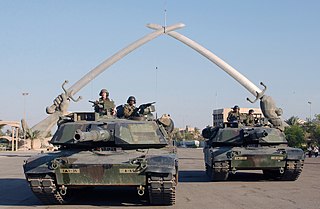Related Research Articles

This is a timeline of the events surrounding the United States-led invasion of Iraq in 2003.

Tariq Aziz was an Iraqi politician who served as Deputy Prime Minister, Minister of Foreign Affairs and a close advisor of President Saddam Hussein. Their association began in the 1950s when both were activists for the then-banned Arab Socialist Ba'ath Party. He was both an Arab nationalist and a member of the Chaldean Catholic Church.

The Battle of Baghdad, also known as the Fall of Baghdad, was a military engagement that took place in Baghdad in early April 2003, as part of the invasion of Iraq.

Sadr City, formerly known as Al-Thawra and Saddam City, is a suburb district of the city of Baghdad, Iraq. It was built in 1959 by Prime Minister Abdul Karim Qassim and later unofficially renamed Sadr City after Ayatollah Mohammad Mohammad Sadeq al-Sadr.

The following is a timeline of major events during the Iraq War, following the 2003 invasion of Iraq.

Haider Jawad Kadhim al-Abadi is an Iraqi politician who was Prime Minister of Iraq from September 2014 until October 2018. Previously he served as Minister of Communication from 2003 to 2004, in the first government after Saddam Hussein was deposed.
Events in the year 2005 in Iraq.

Iraq, officially the Republic of Iraq, is a country in the Middle East. It is a federal parliamentary republic that consists of 19 governorates. The country is bordered by Turkey to the north, Iran to the east, the Persian Gulf and Kuwait to the southeast, Saudi Arabia to the south, Jordan to the southwest and Syria to the west. The capital and largest city is Baghdad. The Iraqi people are diverse; mostly Arabs, as well as Kurds, Turkmen, Assyrians, Armenians, Yazidis, Mandaeans, Persians and Shabakis with similarly diverse geography and wildlife. Most Iraqis are Muslims – minority faiths include Christianity, Yazidism, Mandaeism, Yarsanism and Zoroastrianism. The official languages of Iraq are Arabic and Kurdish; others also recognised in specific regions are Turkish (Turkmen), Suret (Assyrian), and Armenian. Iraq is the 33rd most-populous country in the world and the 14th most-populous country in Asia.
Two car bombs exploded in Baghdad, Iraq at 12:20 on 12 February 2007 in the Shorja market district, killing 76 people, and injuring 155–180.
The 18 April 2007 Baghdad bombings were a series of attacks that occurred when five car bombs exploded across Baghdad, the capital city of Iraq, on 18 April 2007, killing nearly 200 people.
Events in the year 2009 in Iraq.

Al Jahra is a town and city located 32 kilometres (20 mi) west of the centre of Kuwait City in Kuwait. Al Jahra is the capital of the Al Jahra Governorate of Kuwait as well as the surrounding Al Jahra District which is agriculturally based. Encyclopædia Britannica recorded the population in 1980 as 67,311. Historically, Jahra was a predominantly agricultural area. There are currently various farms in Jahra.
On 22 December 2011, a series of coordinated attacks occurred in Baghdad, Iraq, killing 69 people. This was the first major attack following U.S. withdrawal from Iraq.

On 3 July 2016, ISIL militants carried out coordinated bomb attacks in Baghdad that killed 340 civilians and injured hundreds more. A few minutes after midnight local time, a suicide truck-bomb targeted the mainly Shia district of Karrada, busy with late night shoppers for Ramadan. A second roadside bomb was detonated in the suburb of Sha'ab, killing at least five.

As sequel to protests in 2011, 2012 and 2013, Iraqi citizens have also in 2015 up until 2018 often and massively protested against the corruption and incompetence in their government which according to analysts and protesters had led to long-running problems in electricity supplies, clean water availability, Iranian interference in Iraqi politics, high unemployment, and a stagnant economy.

A series of demonstrations, marches, sit-ins and civil disobedience took place in Iraq from 2019 until 2021. It started on 1 October 2019, a date which was set by civil activists on social media, spreading mainly over the central and southern provinces of Iraq, to protest corruption, high unemployment, political sectarianism, inefficient public services and foreign interventionism. Protests spread quickly, coordinated over social media, to other provinces in Iraq. As the intensity of the demonstrations peaked in late October, protesters’ anger focused not only on the desire for a complete overhaul of the Iraqi government but also on driving out Iranian influence, including Iranian-aligned Shia militias. The government, with the help of Iranian-backed militias responded brutally, using live bullets, marksmen, hot water, hot pepper gas and tear gas against protesters, leading to many deaths and injuries.
The COVID-19 pandemic in Iraq was a part of the worldwide pandemic of coronavirus disease 2019 caused by severe acute respiratory syndrome coronavirus 2. During the pandemic, Iraq reported its first confirmed cases of SARS-CoV-2 infections on 22 February 2020 in Najaf. By April, the number of confirmed cases had exceeded the hundred mark in Baghdad, Basra, Sulaymaniyah, Erbil and Najaf.
Events in the year 2021 in Iraq.
On the night of 24 to 25 April 2021, a fire at the Ibn al-Khatib hospital in Baghdad, Iraq, left at least 82 people dead and 110 others injured. The fire was started by the explosion of oxygen tanks designated for COVID-19 patients. A lack of fire detection and suppression systems contributed to the spread of the fire, and many died as a result of being taken off their ventilators to escape. The disaster led to calls for accountability, and the Minister for Health, Hassan al-Tamimi, was suspended by Prime Minister Mustafa al-Kadhimi the following day.

A fire occurred at a Al-Hussein Teaching Hospital for COVID-19 isolation ward in Nasiriyah, Nasiriyah District, Dhi Qar Governorate, Iraq, on 12 July 2021. The fire left at least 60 people dead and another 100 were injured.
References
- ↑ "Iraqi Health Minister resigns after 12 newborns die in Baghdad hospital fire". 11 August 2016.
- ↑ "Men behind Baghdad hospital blaze arrested". 20 August 2016.